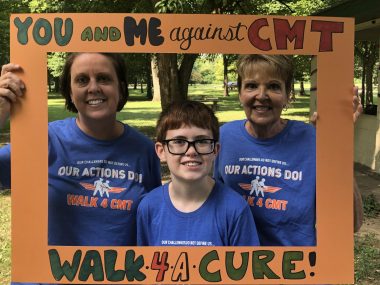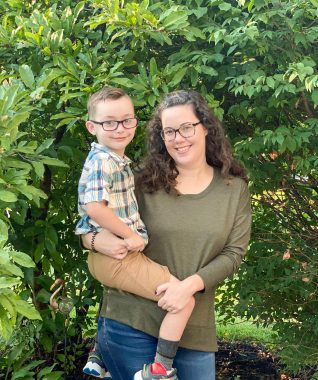Advocates Across Ohio, US, Join Forces to ‘Walk 4 CMT’
Written by |

This weekend at the Westgate Park Open Air Shelterhouse in Columbus, Ohio, walking one step will make an even bigger footprint in the Charcot-Marie-Tooth (CMT) community.
On Saturday, nearly 50 people will walk a mile around the park to raise funds for the Charcot-Marie-Tooth Association (CMTA) and its research and care projects.
This is the first time all Ohio CMTA branches — Cincinnati, Columbus, and Cleveland — have teamed up on the annual Walk 4 CMT fundraiser. The walks will occur in 33 cities across the U.S. this year, with 53 teams signed up so far.

From left, Jill Stuhlmueller, William Stuhlmueller, and Jo Koeing, William’s grandmother, pose with a Walk 4 CMT frame. (Photo courtesy of Jill Stuhlmueller)
So far, the Ohio branch is in second place for money raised, now exceeding its goal of $5,000 by more than $2,800. The Boston branch is in first, with nearly $14,000 raised ahead of its walk on Sept. 18. All branches combined have raised more than $69,750 to date of the organization’s $375,000 goal.
“I feel like it kind of brings us all together and we realize we’re not alone,” said Jill Stuhlmueller in a phone interview with Charcot-Marie-Tooth News. “It just feels kind of like a big hug from the community.”
Stuhlmueller started the Ohio branch shortly after her son, William, now 14, was diagnosed with CMT type 1X in kindergarten in 2012.
She had looked to find a support group of other people affected by CMT around her home in Cincinnati but found nothing. So she took things into her own hands and created her own CMTA faction in Ohio.
The CMTA, which got its start in 1983, focuses on research and care for the CMT community. It created its Strategy to Accelerate Research (STAR) program in 2008 that takes advice from scientific and clinical experts, forms partnerships with pharmaceutical companies, and funds CMT clinics, with the ultimate goal of finding a cure. To date, $17 million has been invested in research, with about 50 projects currently underway at leading labs around the world, according to the website.
Stuhlmueller thought of getting involved with the Muscular Dystrophy Association but felt it wasn’t specific enough for what she wanted to accomplish. She and her mother both have CMT as well, though their symptoms aren’t as pronounced as William’s because he is a boy with x-linked inheritance.
“We thought we know what we have and let’s just try to focus on that,” Stuhlmueller said.
In the approximately six years that Stuhlmueller’s branch has participated in these walks, the amount of money raised has slowly increased, starting from a couple of thousand dollars. Because of COVID-19, Stuhlmueller has not increased the $5,000 goal, though her team had already raised nearly $7,000 for this year’s walk.

Katie Hampton and her son, Marshal Hampton. (Photo courtesy of Katie Hampton)
“Our disability is not going away,” Stuhlmueller said. “We still need whatever help that we can get so we appreciate all of the support, and we’ll try to get bigger and better next year.”
For newer parents, like Katie Hampton, whose 5-year-old son, Marshal, was diagnosed with CMT type 1A in March, Walk 4 CMT is a tangible action she can take to help him. Marshal now has a 3-year-old sister, but Hampton was a first-time mom when she had Marshal.
“They gave us a diagnosis, and they’re like, ‘There’s no treatment, there’s no cure, good luck, do some therapy,'” Hampton told Charcot-Marie-Tooth News in a phone interview. “It’s not good enough. I just want to support any research that they’re doing so that my child has the best future possible.”
A cure is at the top of their minds for both mothers, and also the broader CMTA community of family, friends, doctors, and researchers. As of right now, Marshal and William — and likely all newly diagnosed CMT patients — will have to wear orthotics during the day, do consistent physical therapy, and walk when they want to run, given that there are no treatments that reverse disease progression.
It’s especially difficult for William, who is now in middle school and navigating the challenges of growing up with a muscle disease. His mom wants him to use the elevator to get to his homeroom class that’s up three flights of stairs, but he doesn’t want to single himself out.
“[A cure] would just kind of be a nice relief, to know that nobody else would need to have these worries,” Stuhlmueller said.






